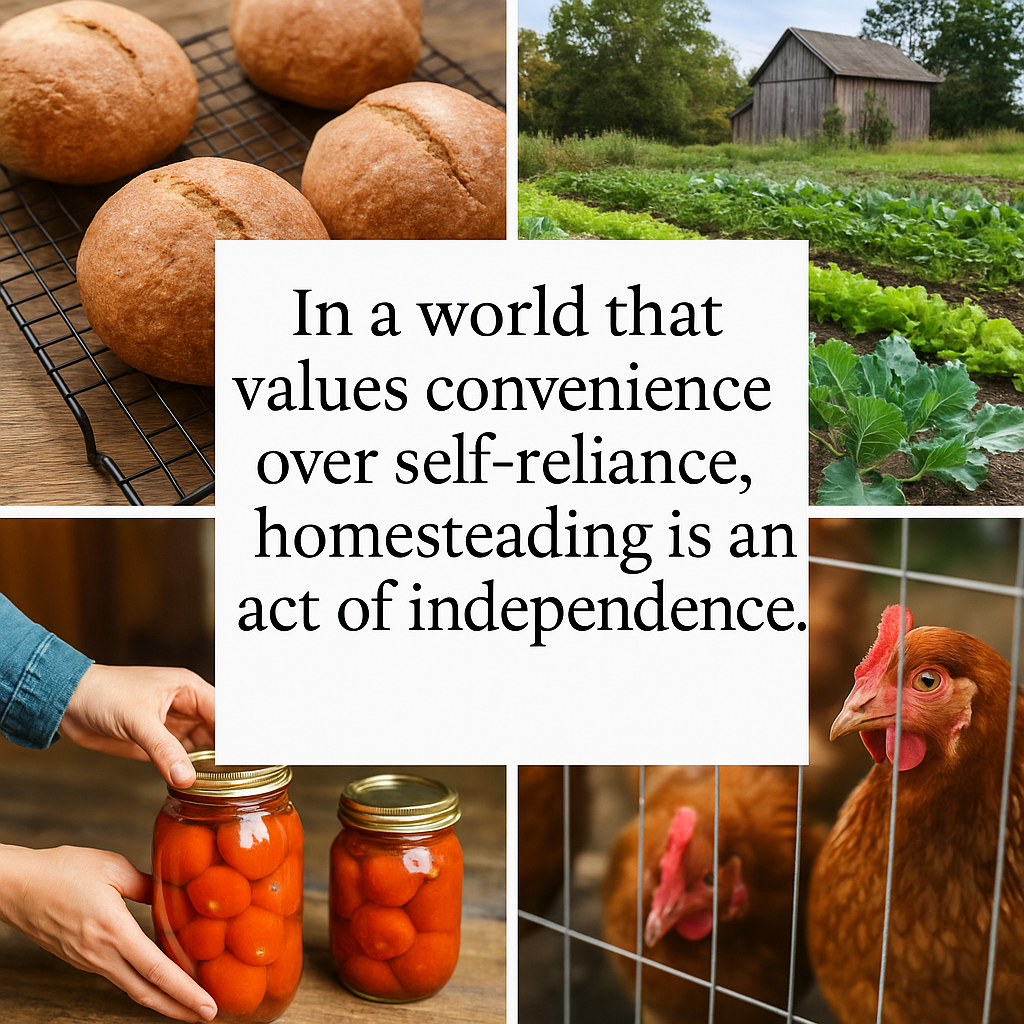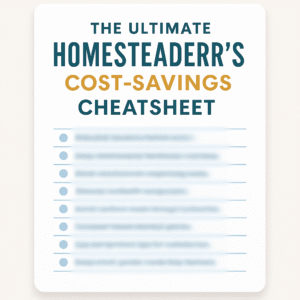We live in an age of convenience.
With the tap of a phone screen, groceries arrive at your door. Dinner can be delivered in less time than it takes to boil pasta. Coffee machines grind, brew, and pour while you’re still half-asleep. Even chores like vacuuming and mowing the lawn have been outsourced to smart devices.

It’s remarkable—and yet, if we’re honest, something feels missing. Convenience promises freedom, but it often delivers dependence. We depend on fragile supply chains, processed foods, and outside systems to meet even our most basic needs. And when those systems wobble, we realize how unprepared we really are.
That’s why more and more people are turning to homesteading. Not as a rejection of modern life, but as a way to reclaim independence within it. Homesteading isn’t about throwing away technology or retreating into the woods—it’s about choosing self-reliance in a world that constantly pushes us toward dependence.
The Hidden Cost of Convenience
Convenience culture is built to save us time, but it often costs us in three big ways:
- Health: Quick meals usually mean processed foods high in chemicals, sugar, and empty calories. Compare that with the nutrition and flavor of homegrown produce or a loaf of bread baked from scratch.
- Finances: Packaged convenience foods, single-use products, and disposable goods may seem cheap, but over time, they bleed money. That $6 latte? Imagine investing that into fruit trees or chickens that give back for years.
- Resilience: Convenience makes us dependent. When supply chains break down or prices skyrocket, we realize how fragile “easy living” really is. Self-reliance, on the other hand, builds resilience that convenience can’t provide.
At its core, convenience turns us into consumers, while self-reliance makes us creators.
The Value of Self-Reliance
So what does self-reliance look like? It’s not about isolation or doing everything yourself. It’s about empowerment. It’s knowing that if systems fail, you can still put food on your family’s table. It’s the pride of using your hands to create something useful. And it’s the peace of mind that comes from independence.
Here’s why homesteading as a path to self-reliance matters:
- 🌱 Fresher Food: A tomato picked from your backyard doesn’t just taste better—it’s healthier and untouched by chemicals used for long-haul shipping.
- 💰 Lower Costs Over Time: Yes, there’s an upfront investment in a raised bed or a chicken coop, but the payoff in reduced grocery bills and self-produced goods is enormous.
- 🛡️ Security & Resilience: You’re not at the mercy of price spikes or shortages when you can grow, preserve, and store your own food.
- 🛠️ Skills & Satisfaction: Learning to make bread, repair tools, or preserve vegetables isn’t just practical—it’s deeply fulfilling.
Even one small step toward self-reliance can make a meaningful difference. A single raised garden bed can produce greens for your table every week. A compost bin turns kitchen scraps and fall leaves into rich soil. Three hens can provide a steady supply of eggs.
Homesteading as Modern Independence
In the past, self-reliance was a necessity. Families grew food, canned goods, and bartered with neighbors because they had to. Today, we live in a world of abundance and options. Which makes choosing self-reliance all the more powerful.
Homesteading today isn’t about survival—it’s about freedom. Freedom from rising grocery bills. Freedom from processed, unhealthy foods. Freedom from the fear of “what if the shelves are empty?”
And here’s the beauty of modern homesteading: you don’t need acres of farmland to start.
Small steps toward independence add up:
- Compost kitchen scraps and autumn leaves. ♻️
- Grow herbs on your windowsill. 🌿
- Plant garlic this fall—it’ll reward you next summer. 🧄
- Keep a small flock of hens for fresh eggs. 🐓
- Learn one new skill, like baking bread, fermenting sauerkraut, or making soap. 🥖🧼
Each small step makes you less dependent on convenience systems and more confident in your own resourcefulness.
Why Self-Reliance Matters Now
There’s never been a better time to rethink how we live. Just look around:
- Rising food costs: Grocery bills are hitting record highs. Growing even part of your own food offsets the pinch.
- Fragile supply chains: The past few years have shown us how easily global systems can be disrupted. A pantry of home-canned goods is priceless when shelves are empty.
- Environmental concerns: Homesteading naturally reduces waste, cuts reliance on plastic packaging, and keeps food miles close to zero.
- Mental health: Time spent in the garden, tending animals, or cooking from scratch reduces stress and creates connection with the natural world.
Homesteading isn’t just practical—it’s purposeful.
Busting the Myths of Homesteading
A lot of people hesitate because they think homesteading requires too much land, money, or time. Let’s bust those myths:
- Myth 1: You need acres of land.
Truth: A balcony garden, patio planters, or even indoor herbs are homesteading. It’s about mindset, not acreage. - Myth 2: It takes too much time.
Truth: Systems like drip irrigation, mulching, and composting actually save time. A well-designed homestead often runs itself. - Myth 3: It’s expensive to start.
Truth: Some of the best homesteading tools are free or cheap. Fall leaves = compost. Kitchen scraps = garden gold. A few hens = daily eggs. Many projects save money right away.
The Case for Homesteading
So where does that leave us? Convenience has its place—there’s nothing wrong with ordering pizza after a long day. But if we want true independence, resilience, and freedom, self-reliance is the smarter choice.
Homesteading is not about going without. It’s about choosing with. Choosing to live with purpose. Choosing to create rather than consume. Choosing to build independence in a world that constantly pushes us toward dependence.
And here’s the best part: you don’t need to wait. You can take your first step toward self-reliance today. Start small, grow slow, and build momentum. Before you know it, you’ll look back and realize—you’re already living the homestead life you’ve dreamed about.
Final Encouragement
Homesteading isn’t just a lifestyle. It’s a quiet revolution against convenience culture. Every seed planted, every egg collected, every loaf baked is an act of independence.
And the case for homesteading has never been stronger.
🌻 So here’s your invitation: take your first step today. Start with one small project, and let it grow into something bigger. You’ll discover that self-reliance doesn’t just save money—it gives back something much more valuable: freedom.
